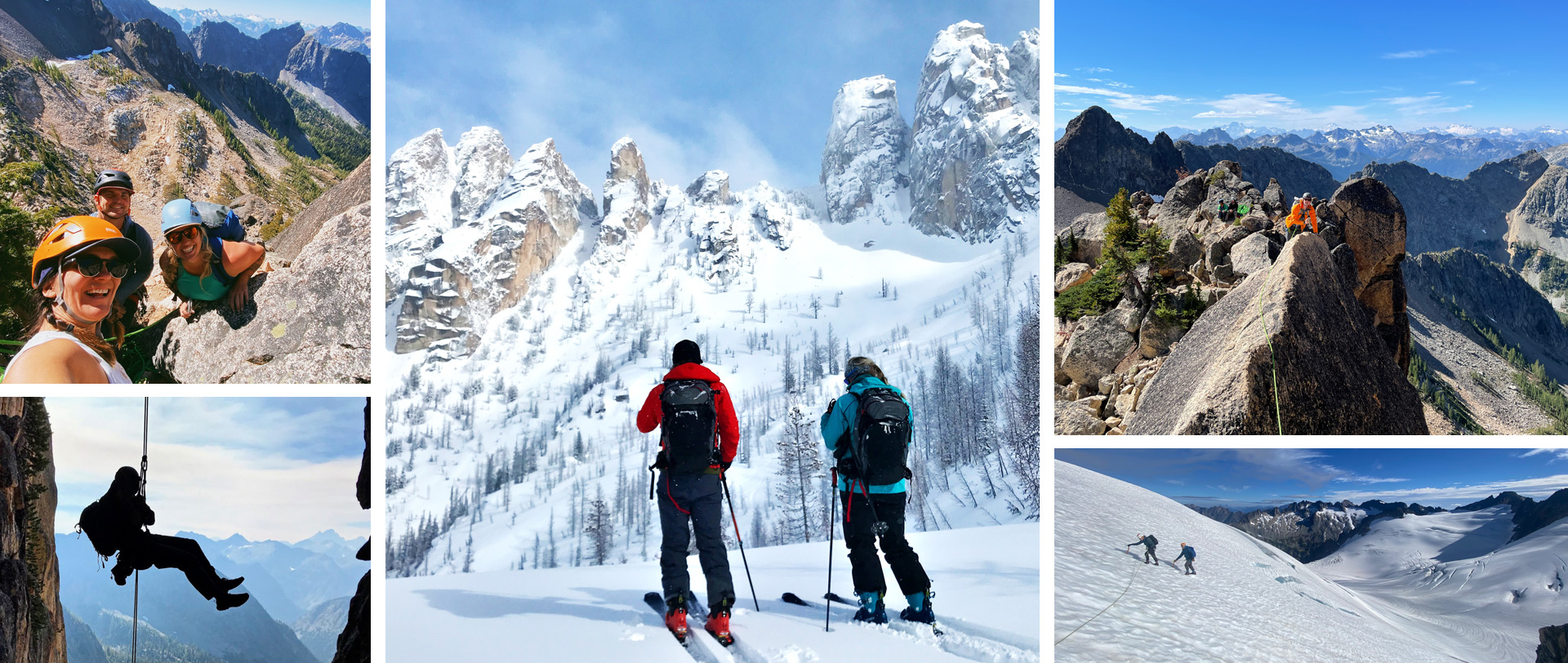Plan an Adventure
Featured Trips


Choosing a guide service for your next climbing or skiing adventure can seem like a daunting task. There are many companies out there offering seemingly similar experiences. How do you separate the exceptional trips from the average? Here are a few factors you should consider when shopping around for your next adventure.
The first thing you will want to do before booking a trip with any company is to find out who the guide(s) will be for that particular trip. Not all guides are created equal and the guide’s experience, training, and personality play a major role in the safety, success and enjoyment of any trip in the mountains.
Avoid booking a trip with a guide service that cannot tell you who your guide will be. Many guide services employ dozens of guides with a wide range of experience and training. You want to make sure that you do not end up with the least qualified guide on their roster.
Once you find out who your guide is, ask about their qualifications.
The ideal guide will have many years of guiding experience combined with a certification from the American Mountain Guides Association (AMGA). There are many qualified guides out there that are not AMGA certified but going with a certified guide ensures that they have gone through intensive training and have passed a difficult examination of their guiding skill and judgment.
“AMGA Accredited Guide Service” does not necessarily mean your guide is going to be certified. This is just a stamp of approval of the company’s business practices, not the competence of their guides.
Use a reference if possible. The mountain guiding community is a small community. Ask for recommendations from your last guide or from friends that have had quality experiences in the past.
The lower the guest-to-guide ratio the better. Lower ratios allow for an increased safety margin, higher success rates, and a much more enjoyable experience. Lower ratios often cost a little more but the added benefits of a low ratio are well worth the added expense.
Low ratio is a relative term that varies depending on the difficulty of the trip. For example, technical alpine climbing requires ratios in the 2-to-1 or even 1-to-1 range, whereas a day of top-rope rock climbing could be as high as 4-to-1. When it comes to ski touring and ski mountaineering low ratios are in the 3-to-1 or 4-to-1 range.

In the United States, the access to public lands for guided groups are regulated by the local land managers. Most guide services have limited access to these lands. For example, if you are looking for a summit climb of Mt. Rainier there are only a handful of guide services that have permits to guide that mountain. You will want to make sure the guide service you are talking to can take you to the mountain you want to climb.
When it comes to backcountry skiing you should make sure that the guide service has access to terrain that is likely to produce good snow and good skiing. This may seem obvious but with the way permits work in the U.S., not all guide services that offer backcountry skiing have access to quality terrain.
For foreign trips, we recommend going with a fully licensed IFMGA guide. These guides have passed all of their AMGA exams in Ski Mountaineering, Rock Climbing, and Alpine Climbing. These guides have attained the highest level of certification and are the only guides qualified to take you to places such as the European Alps and other countries that are members of the IFMGA.
The number one factor when it comes to the safety of a trip is the quality of the guide. That being said, there are times when things go wrong in the mountains and a solid backup plan is needed. When booking your next trip ask about the risk management plans that are in place for this particular trip. Specifically, what is the emergency communication situation (sat phones, cell phones, radios, etc…), what type of medical training do the guides have, and what emergency gear is carried into the field? This will give you a better idea of how prepared the guide and the guide service is in the case of an emergency.
If you would like help booking your next trip, need a reference for a guide in a location that we currently don’t offer trips to or have any questions about how to choose a guide service please don’t hesitate to contact us.
These days there are many guide services operating in the US and in the PNW, which is great for the amount of offerings available, but it does make it hard to discern which company may fit your needs best.
At NCMG, our core philosophy is centered around high quality, low ratio, custom trips, with some of the most experienced and professional guides in the industry.
With this philosophy in mind, we are able to take people like you into the heart of the North Cascades, the granite towers of Washington Pass, or skiing dream objectives in the European and American Alps.
Our guides love what they do. Sharing incredible places and climbs with people looking to push their limits, get back to the joy they felt when they climbed or mountaineered in the past, or those starting at the very beginning of their climbing journey. That’s what sharing time in the mountains is for us at NCMG - a journey and an experience.
